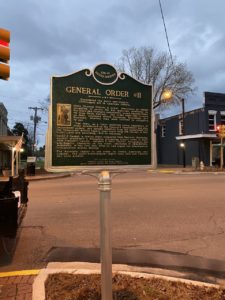What people believe prevails over the truth. Sophocles
By Jerry Klinger

 BOYNTON BEACH, Florida — A statue in San Francisco’s Golden Gate Park, dedicated to President U.S. Grant, was torn down on June 22, 2020 by a Cancel Culture mob. Nine months later on March 18, 2021, a historical marker donated by the Jewish American Society for Historic Preservation, with support from the City of Holly Springs, Ms., and the Marshall County Historical Society Museum was sited in Holly Springs. It recalled the worst antisemitic Government act in American history, the infamous, now largely forgotten General Order #11.
BOYNTON BEACH, Florida — A statue in San Francisco’s Golden Gate Park, dedicated to President U.S. Grant, was torn down on June 22, 2020 by a Cancel Culture mob. Nine months later on March 18, 2021, a historical marker donated by the Jewish American Society for Historic Preservation, with support from the City of Holly Springs, Ms., and the Marshall County Historical Society Museum was sited in Holly Springs. It recalled the worst antisemitic Government act in American history, the infamous, now largely forgotten General Order #11.
The marker’s text:
Union General Ulysses S. Grant, frustrated by illegal smuggling of cotton for war materials conducted by Northern and Southern speculators, issued General Order #11 from Holly Springs. The order explicitly focused on Jews, anywhere within Tennessee, Mississippi, and Kentucky, whether they were involved in smuggling or not.
“The Jews, as a ‘class’ violating every regulation of trade established by the Treasury Department and also Department orders, are hereby expelled from the Department [of the Tennessee] within twenty-four hours from the receipt of this order…and any returning…will be arrested.”
Cesar J. Kaskel, a Jewish Union supporter from Paducah, Kentucky, quickly organized a delegation protesting Grant’s order to meet with President Lincoln. Lincoln, recognizing the antisemitic character of the order, rescinded it immediately on January 4, 1863. It was four days after he had signed the Emancipation Proclamation ending Slavery.
The economic impact of the order on Jewish Americans was nominal. The socio-psychological impact upon Jews and America was much greater.
It was a time of Civil War. The Union was not winning. There was some movement in the West under Grant. In the East, General Robert E. Lee had stalemated the best the North could do. Internationally, Great Britain the largest buyer of American cotton, pressured by British textile interests, was inclining towards recognition of Southern independence.
Grant needed to choke the South militarily and economically. He was successful in neither. Cotton, as an economic necessity was needed by the North and the South. Some Jews were in involved in the illegal cotton trade, but not many. There were not that many Jews in the West, or in the U.S. Most of the illegal trading in cotton and contraband items was done by Christians from the North and the South.
War created opportunity and money was to be made.
Grant, as most Americans, was subject to the culture of his times, traditional mild antisemitism tempered by American idealism. But it was war and Grant did not want and refused to be distracted by political correctness. Confronted by Jews being involved in the illegal cotton trade, even worse with his father, whom he detested, Grant acted.
It has never been determined if Grant wrote General Order #11 or a subordinate wrote it for him. Who wrote it, did not matter. Grant’s signature was on the order.
Grant, to his credit, accepted the repercussions of leadership and command. He never pointed the finger of responsibility at anyone else.
Of all the generals the North fielded in the war to end slavery, it was Grant who finally defeated Robert E. Lee. Lincoln wrote the words to end slavery, but it was Grant who actually ended it.
Grant was elected President of the United States in 1868. During his first term the Ku Klux Klan was born of bigotry, hatred, ignorance, and political intimidation. Grant acted aggressively to protect the American rights of the newly freed slaves.
He pressured Congress to pass three major “Force Acts. ”The first Enforcement Act specifically prohibited organized mobs from going around in disguise to intimidate and violate the rights of any citizen. The second and the third “Force Acts,” known as the Ku Klux Klan Acts, put elections under Federal supervision when intimidation was used. The third gave the President the power to suspend Habeas Corpus and use military power to enforce the acts.
Grant did not delay crushing the Ku Klux Klan.
He explained, “I will not hesitate to exhaust the powers thus vested in the Executive, whenever and wherever it shall become necessary to do so for the purpose of securing to all citizens of the United States the peaceful enjoyment of the rights guaranteed to them by the Constitution and laws.”…
Perhaps, 100 Jewish families were immediately impacted by General Order #11.
The Jewish Record, N.Y., January 13, 1863, reported how Grant’s Order worked before it was revoked…
A Jew complained to the Military Officer arresting him.
“Gentleman.—”I should like to know the cause of our detention.”
Colonel.—”I do not feel inclined to give any.—in about half an hour, you will leave for Cairo and Alton.”
Gentleman.—”Colonel, can I sell my horse and buggy?”
Colonel.—”No, sir. You have nothing to sell. You have to leave on the next train under guard.”
Our informant (next) asked Gen. Tuttle why he was expelled from the Department. The only reply was:
“Because you are Jews, and they are neither a benefit to the Union or Confederacy.”
Jewish Union Captain Philip Trounstine, Co. “B” 5th Reg. O.V. C., resigned his commission writing:
“I can no longer bear the yaunts and malice of those to whom my religious opinions are known, brought on by the effect that that Order has instilled into their minds.”
A resolution condemning Grant’s Order against the Jews was defeated in the House of Representatives and the U.S. Senate.
Grant’s Order challenged Jewish assumptions about America and the freedoms she claimed for all in the Constitution.
As President of the United States Grant appointed more Jews to positions of prominence than all the previous administrations combined.
When Russian and Rumanian antisemitism rose with blood curdling terror against the Jews in their territories, Grant put the power and the prestige of the United States of American on the line by aggressively opposing antisemitism. He further deliberately appointed a Jew as ambassador to Romania. Grant wrote, “The United States… knowing no distinction of her citizens on account of religion or nativity, naturally believes in a civilization the world over which will secure the same liberal views.”
Near the end of his second term, Grant and his entire cabinet attended the dedication of the new Adas Israel synagogue in Washington, D.C. A president had never attended a Jewish service before. Grant even made a generous donation to the building fund. Grant’s attendance powerfully signaled; Jews were co-equal citizens, and Judaism was a legitimate religious path in America.
His second term had a focus that was very important to Jews, separation of church and state. He actively called for free, non-sectarian, non-indoctrinating public education for all children.
In his final State of the Union address, Grant favpred, “forbid(ing) the teaching in said schools of religious, atheistic, or pagan tenets; and prohibiting the granting of any school funds or school taxes…for the benefit or in aid, directly or indirectly, of any religious sect or denomination.”
Grant never spoke of the darkness of General Order #11 in public, as President or in his memoirs. He let his actions speak for him.
If he was antisemitic, he grew, changed, and worked to make amends to Jews and for all Americans.
If Cancel Culture had existed in 1863, they would have successfully obtained Grant’s removal from Command. The Civil War might have ended differently. The slaves might have remained slaves. America would have been permanently divided.
Cancel Culture’s short term, self-gratuitous, vision would have become America’s long-term loss.
Oscar Wilde, the famed British writer, observed, “The only difference between the saint and the sinner is that every saint has a past, and every sinner has a future.”
*
Jerry Klinger is the President of the Jewish American Society for Historic Preservation. www.JASHP.org